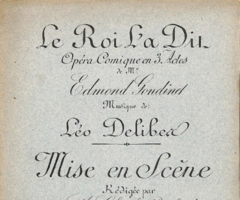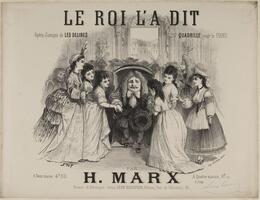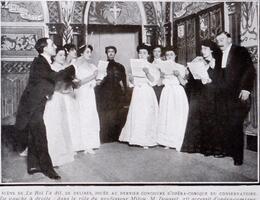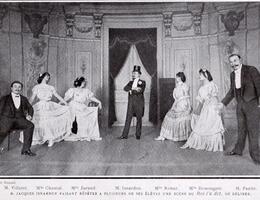Le Roi l’a dit
Opéra-comique en 3 actes créé à l'Opéra-Comique de Paris.
Le roi l’a dit, the first work by Léo Delibes to be presented at the Opéra-Comique, opened a new chapter in his career. Edmond Gondinet’s libretto tells of the Marquis de Moncontour, whose wish of being presented to Louis XIV is at last fulfilled. He is the father of four daughters, but when asked by the king if he has a son and heir, he replies in the affirmative and promises to present his son at court. Now he is faced with the problem of where to find a son! He entrusts his dancing master with the task of educating Benoit, a young peasant. However the latter, taking his role far too seriously, causes trouble in the household. In the end Benoit feigns to be dead in a duel, and the Marquis receives the king’s condolences, which finally frees him from his deceit: “Vous êtes mort, le roi l’a dit” (“You are dead, the king has said so”). The Marquis is made a duke by the king in compensation for his loss; Benoit marries his sweetheart, Javotte (one of the four daughters), and the work ends with everyone quite happy. Aware of being at the Opéra-Comique and not at the Théâtre des Bouffes-Parisiens, Delibes did not bring out the subversive side of the libretto. His music, never vulgar, waxes sentimental and poetic whenever the opportunity arises; moreover, the historical context enabled him to return to the pastiche of earlier music of which he was particularly fond. The work was well received by the critics. In the aftermath of the Franco-Prussian war, Delibes was hailed as the champion of the French opéra-comique, as opposed to those musicians who were committed to following the precepts of Wagner. But Le roi l’a dit received no more than forty performances in that first season. Two productions at the Opéra-Comique, in 1885 and 1898, with revised librettos, were no more successful. A fairly good reception abroad, especially in Germany and Austria, and occasional revivals in the twentieth century, did not succeed in making it popular with audiences, despite a still very positive critical reception.




